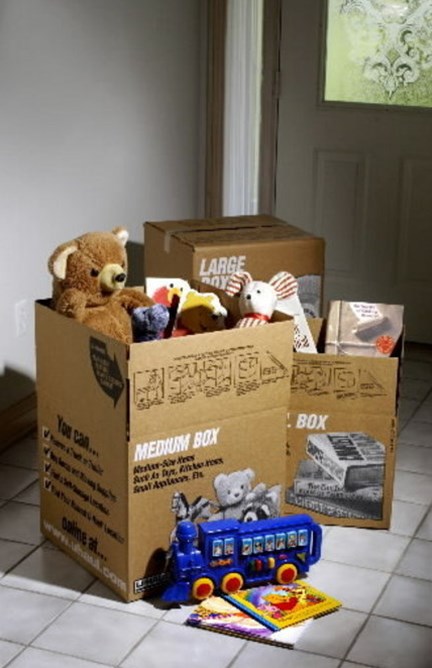
Have a family meeting. Children gain greater control over their fear and anxiety by directly participating in moving-related activities. Involve them in the decision-making process as much as possible. Encourage them to express their feelings and concerns. Make a family wish list. This will help you reach a consensus on some of the things you all want from your new home, like a bigger backyard, a playroom, and separate rooms for each child.
If practical, house-hunt together. Take your kids with you to look at potential houses or apartments, and schools. If you are moving out of state, and your little ones can’t join you, take pictures of possible homes, the school, a local park, mall, or other things that may interest them. If you’re searching online, bookmark your favorites so your kids can take a look.
Use a map to help your kids understand the new area and the route you will take to get there. If possible, let your children visit the new home before moving day, and point out where everyone will sleep, eat, and play. You don’t have to make everything sound wonderful; honest, matter-of-fact information will be most helpful in the long run. If you oversell things and raise expectations, there is room for disappointment.
Infants, toddlers, and preschoolers are not able to understand the meaning of the move or complex explanations. They are affected more by the reactions and availability of their caretakers. Little kids do best when things are predictable; so keeping a routine with familiar things and people eases the transition for them. Avoid making other changes at the same time as the move, such as toilet training or transfer to a new bed, so as not to overwhelm and confuse a young child.
Let your kids draw a picture of their new bedrooms. Make it a fun art project that will excite them about the move. Also, let them take pictures to document your move. Once you are settled in, make time together to create the “moving” chapter of your family photo album.
For children, moving to a new home means leaving friends, schools, and local hangouts. It is important to help your children say goodbye and set up ways for them to stay connected to old friends after the move. Invite their friends and classmates to a Going Away party. Emphasize how easy it is to keep in touch through mail, email, and the telephone. Give each of your children his or her own address book and make the party an opportunity for friends to record their personal contact information. Take pictures of “favorite places and people” and have each friend create a goodbye page to make a “Goodbye Memory Book.”
On moving day, let each child pack and label a box of his or her favorite things that can be opened immediately upon arriving at your new home. If possible, set up the kids’ bedrooms first so they can be surrounded by familiar things.

If possible, time the move to happen before the start of a new school year so children have an opportunity to meet new friends before school begins. School-age children are likely to be concerned about fitting in with new peers and dealing with different academic demands, so help your children make new friends. Ask the new school if they have a buddy system to help guide each child through school for the first few weeks, introduce your kids to other students, and accompany them to activities. Their general personality and social style may influence their ease in adjustment. They may also be better able to tolerate the new kid jitters if a sibling will be at the same school.
Encourage children to become involved in a sports team or school club. These groups provide a ready-made set of peers on a regular basis. It becomes easier for a child to then say “hi” and to avoid feeling like a stranger in the lunchroom. Joining a team or a club not only provides the benefit of a ready group of peers with a similar interest, it offers an adult contact for the child and for the parent as well.
If there is one, buy a guidebook for your new city. Grab it and a calendar and sit down with the kids to plan some fun outings around the area. Whether you decide on apple picking at a local farm, or hitting the natural science museum, it’s important to engage your kids and show them all that your new hometown has to offer. If they’ve met some new friends in your neighborhood or at school, encourage each child to bring a friend along on your outings.
Scheduling some trips away from the new home may actually help establish the new base. It becomes the place to “come home to” and enhances the sense of a familiar place.
Access religious and community organizations. They can provide a ready structure of activities, contacts, and resources for the whole family. If the family was involved with similar groups before, participating in such activities in the new location can increase feelings of familiarity.
Finally, get back to the status quo. When you are settled in your new home, resume familiar routines as soon as possible. Do your best to keep things like mealtime, bedtime, and family time the same.
Remember to say “I love you.” Your children may feel that everything has changed but it can give them a good feeling to know that your love has not.

Subscribe to Reliable Van And Storage's Blog

















Comments